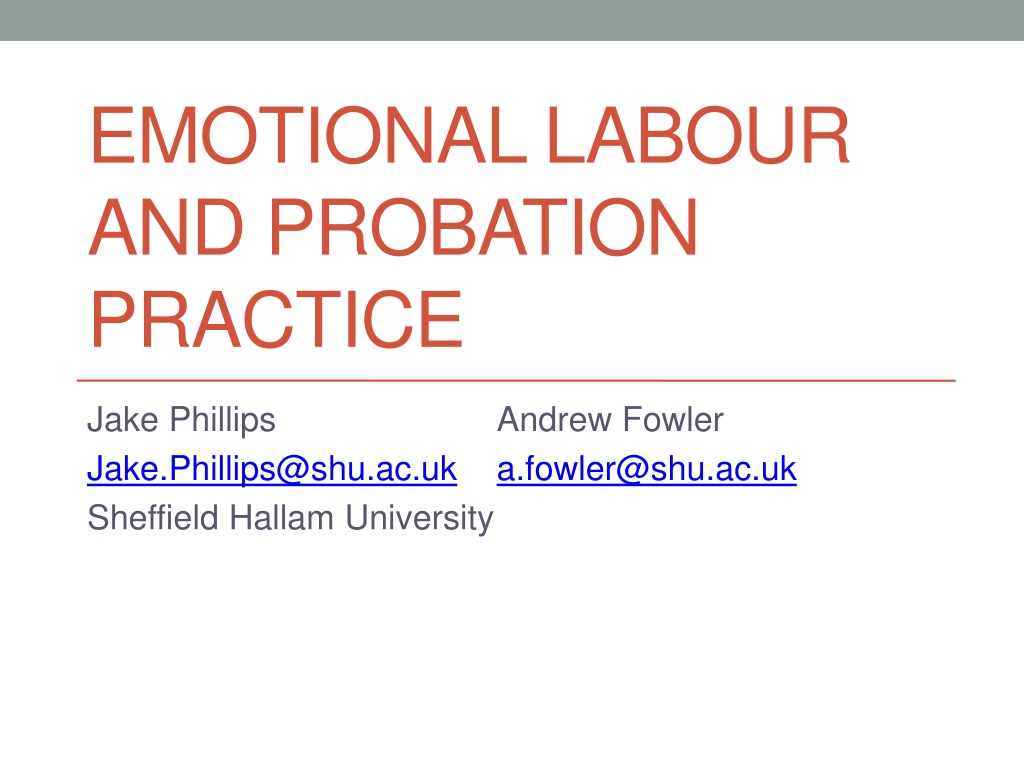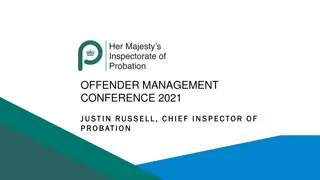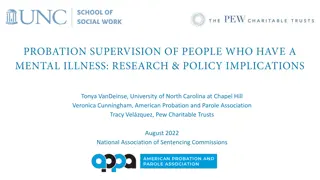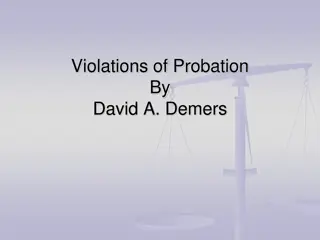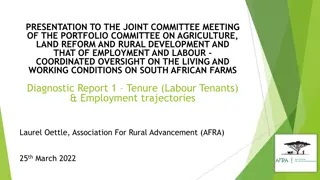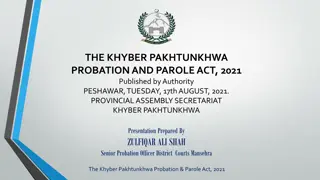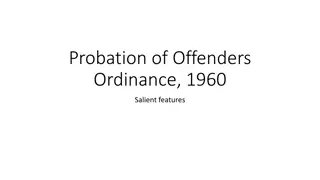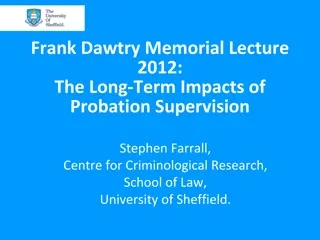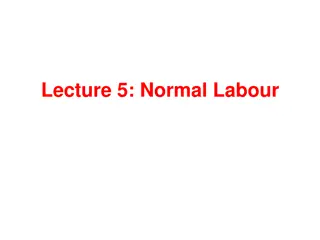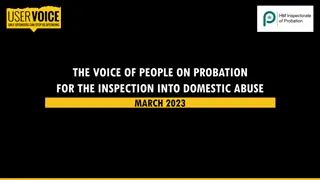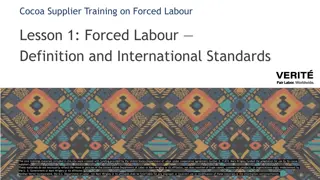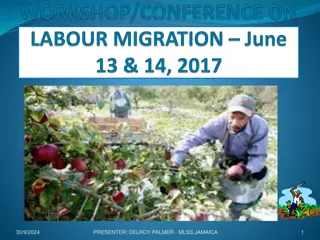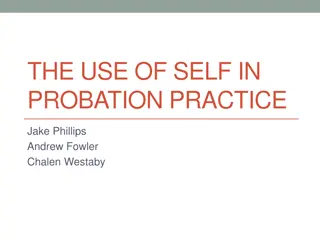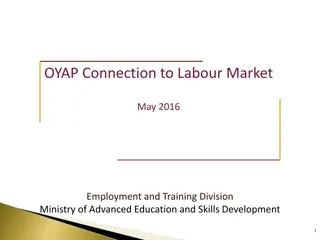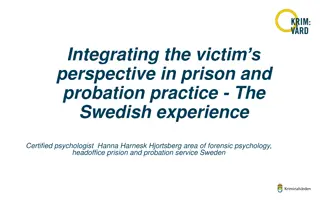Understanding Emotional Labour in Probation Practice
Explore the concept of emotional labour in probation practice, highlighting the management of emotions, impact on research and practice, links to burnout, and the role of managerialism and rationality. Delve into emotional work, Chamberlayne's 'emotion work', and feeling rules associated with emotional labour. Learn about surface acting versus deep acting and the significance of emotional detachment for professionalism.
Download Presentation

Please find below an Image/Link to download the presentation.
The content on the website is provided AS IS for your information and personal use only. It may not be sold, licensed, or shared on other websites without obtaining consent from the author. Download presentation by click this link. If you encounter any issues during the download, it is possible that the publisher has removed the file from their server.
E N D
Presentation Transcript
EMOTIONAL LABOUR AND PROBATION PRACTICE Jake Phillips Jake.Phillips@shu.ac.uk Sheffield Hallam University Andrew Fowler a.fowler@shu.ac.uk
Aims To outline emotion work and emotional labour Overview of emotional labour research in criminology Potential for probation research and practice Links to burnout Our research
The Context managerialism - key driver to meet service aims reducing reoffending and protecting public rationality sentencing - objective, logical, not tainted by emotions historically suspicious of emotions and criminology's approach to emotions has been cautious (Karstedt et al 2011) National standards, SSSJ
Emotion work Chamberlayne's 'emotion work' hard / soft - hard voice of professionalism / productivity and soft voice emotional often associated with female (Bolton 2005; Knight 2012;2014) Emotional arena (Crawley 2009); emotionally charged arena (Knight 2014) Emotional literacy- skills that probation officers may use in understanding their own emotions and working effectively and appropriately with the emotions of people on probation (Knight 2012) recognising strong feelings to some offences / people empathy resilience
Emotional Labour The way in which workers display and manage their emotions Emotions are managed in a way which is both expected by and defined by the employer/codes of conduct/codes of practice/ethics... Is linked to the goals of the organisation Practitioners encouraged to maintain an emotional detachment in the pursuit of professionalism and efficiency Voice to voice/face to face 'The induction or suppression of feeling in order to sustain an outward appearance that produces in others a sense of being cared for in a convivial, safe place' Hochschild (1983)
Emotional Labour Feeling rules: includes who does the emotional work in the organisation; specifying: range; duration; intensity and object of emotions that should be experienced (Hochschild 1983:89) Hochschild (1983) draws distinction between surface acting and deep surface acting Deep surface acting - genuinely feels emotions which they want to display Surface acting - feigns 'appropriate' emotions Front stage transaction - performed at behest of organisation (Goffman 1959)
Types of emotional labour Bolton (2000) - motivations behind emotionful work: Philanthropy - emotion management given as a gift Presentational - in accordance with social rules Prescriptive - in line with organisational aims or codes Pecuniary - emotion management for commercial gain
EL Research in CJS The police (Van Stokkom 2011) Lawyers and law students (Westaby 2010:1) Magistrates (Anleu and Mack 2005:614) Prison Officers (Crawley 2004:xiv) Care managers; social work (Gorman 2000; Chamberlayne 2001)
Sheds light on... burnout from over-identification with a client (Westaby 2010) diminishing job satisfaction from depersonalisation (Anleu and Mack 2005) routine emotional work inhibiting the ability to feel certain emotions outside of that role (Crawley 2004;147) lack of emotional regulation leading to aggression, debasing the profession (Van Stokkom 2011; 249).
Potential for probation research Helps us to understand: What emotions are used in probation practice and how they are managed. The relationship building process - an inherently emotional process? The way in which compliance and breach decisions are affected by, or affect, emotions of workers (and offenders) Consequences for compliance, the probation officer and the probationer if emotions supressed? Whether there is a (perceived) link between 'deep surface acting' and substantive compliance. The impact of TR on risk assessments (e.g. when worker not in direct contact with offender) What happens if emotion work occurs 'underground' (Knight 2012)?
Focus of research To qualitatively assess the impact of emotion work in probation with a focus on: High risk offenders Development of the relationship Compliance and breach related decision making process Decisions made at a distance Stress and burnout 'Difficult' offenders (as defined by offence type, levels of remorse, chaotic offenders, levels of compliance)
Burnout Exhaustion, cynicism, inefficacy, depersonalisation Literature on burnout in criminal justice practice: Adams et al (2010) stressors and strains amongst Police; Schaible and Gecas (2010) emotional labour and value dissonance on burnout amongst Police Officers; Collins et al (2009) stress and well-being perceived by probation trainees; Griffin et al (2009) job satisfaction and burnout correctional staff; Tewksbury and Higgins (2006) emotional dissonance and work stress amongst correctional staff.
Emotional Labour and Burnout Relationship between emotional labour and levels of burnout (Brotheridge and Grandey; 2002; Krummel and Geddes, 2000) Potential link between deep surface acting and burnout Maslach Burnout Inventory
Potential for probation policy/practice Better understanding of staff wellbeing and how to improve it, if necessary Greater understanding of what helps offenders to comply (formally or substantively) Understanding of how TR has impacted on decision making processes Acknowledgement that emotions play a part, and that they are important
Thank you! Any comments or questions?
EMOTIONAL LABOUR AND PROBATION PRACTICE Jake Phillips Jake.Phillips@shu.ac.uk Sheffield Hallam University Andrew Fowler a.fowler@shu.ac.uk
